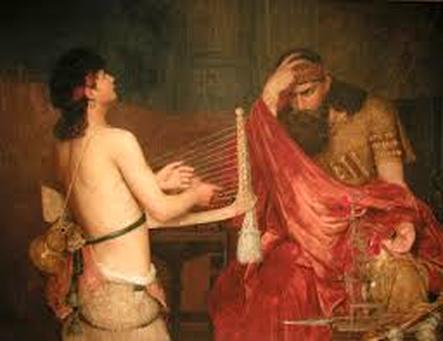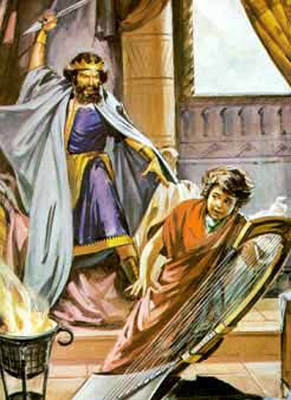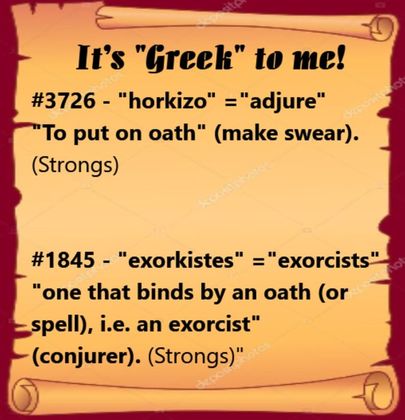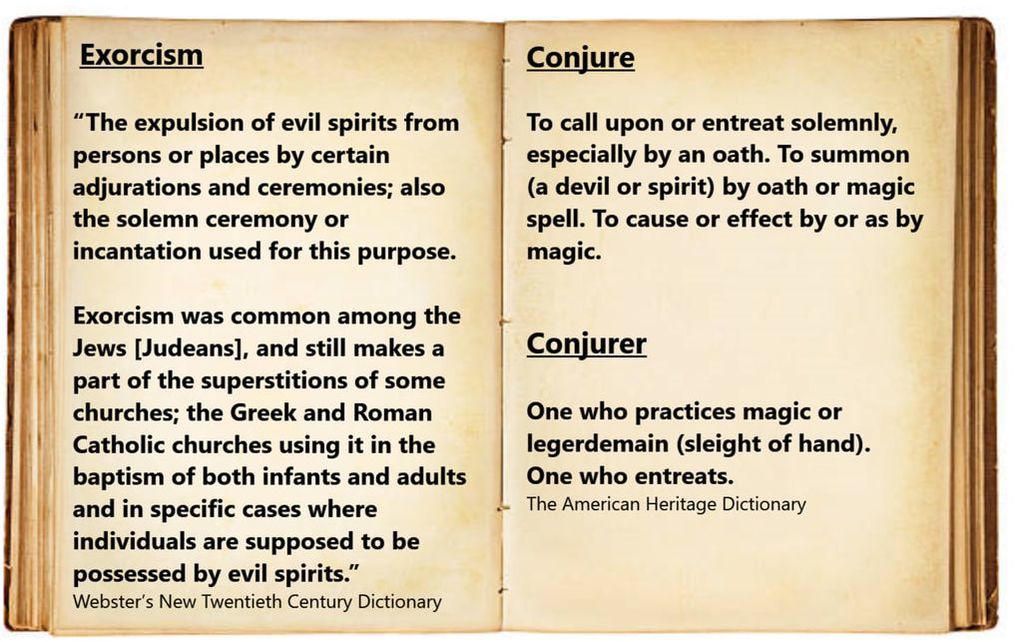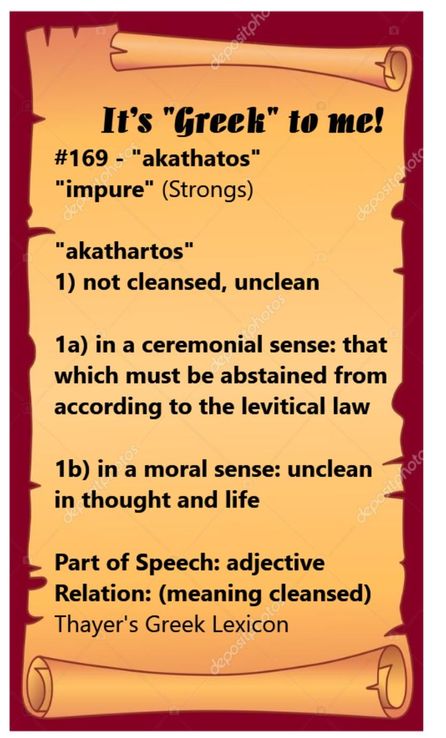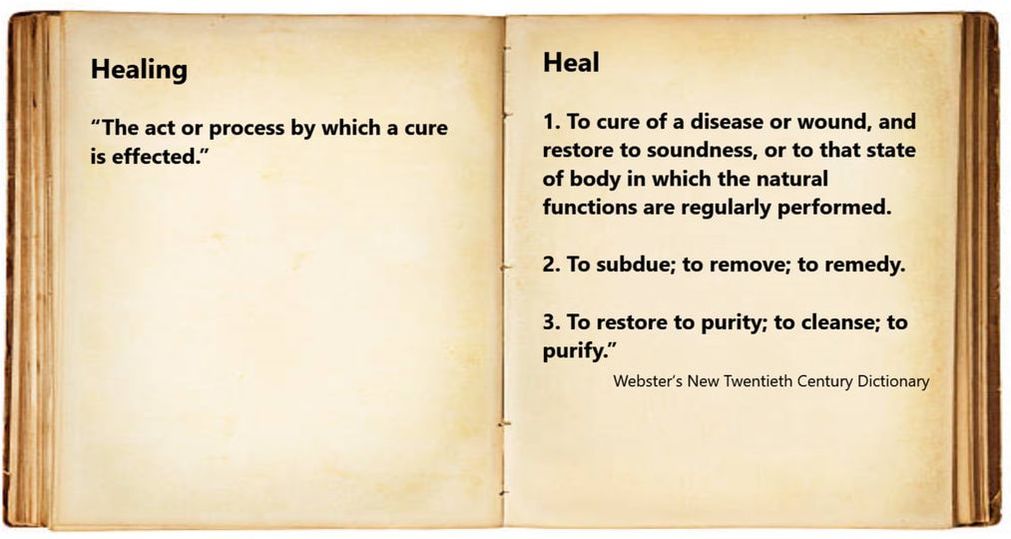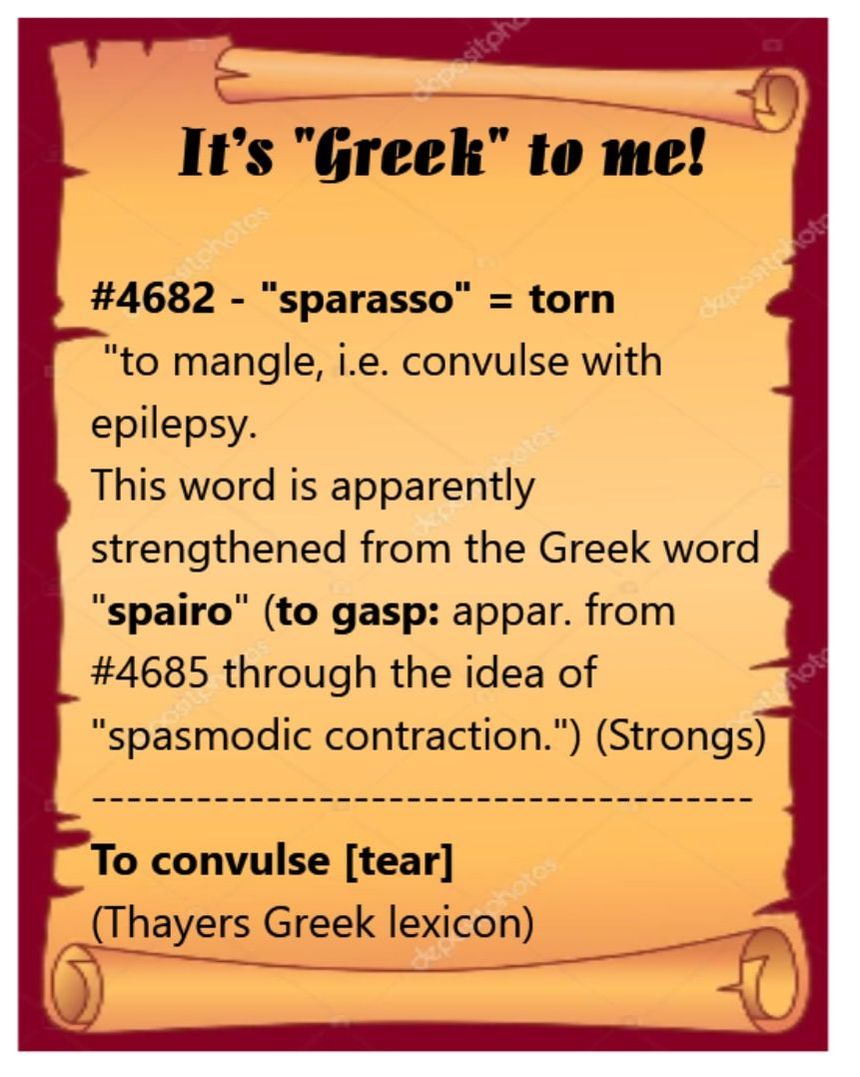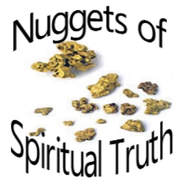“The wicked flee when no man pursueth:…” Proverbs 28:1
In the lesson entitled “Spirit & Spiritism,” we exposed the superstitious pagan origin of a belief system known as “Spiritism:” consisting of a mythical “spirit realm” inhabited by so-called “spirit beings” that supposedly have the power to scare, torment and possess people. This diabolical philosophy has its roots in the spurious “immortal soul” doctrine (see the lesson entitled “The False Immortal Soul Doctrine”) and has continuously been used over the centuries to control people through fear.
In this lesson we will take a closer look at these mythical creatures that exist only in the twisted imaginations of people and see how incorrect, twisted and downright dishonest translations of God’s Word appear to support their supposed existence. We will look at the scriptural use of the terms “unclean spirit,” “evil spirit,” “devil” and “demon,” as well as the expressions “being possessed” and “casting out.” By removing superstition and mysticism, the true nature of these terms and expressions will be revealed and free the truth seeker of erroneous beliefs. Knowledge of the true scriptural meaning of “spirit” (motivation, disposition, state of mind), as revealed in the lesson on “Spirit & Spiritism,” will free one from the power of those who manipulate through fear and intimidation.
In this lesson we will take a closer look at these mythical creatures that exist only in the twisted imaginations of people and see how incorrect, twisted and downright dishonest translations of God’s Word appear to support their supposed existence. We will look at the scriptural use of the terms “unclean spirit,” “evil spirit,” “devil” and “demon,” as well as the expressions “being possessed” and “casting out.” By removing superstition and mysticism, the true nature of these terms and expressions will be revealed and free the truth seeker of erroneous beliefs. Knowledge of the true scriptural meaning of “spirit” (motivation, disposition, state of mind), as revealed in the lesson on “Spirit & Spiritism,” will free one from the power of those who manipulate through fear and intimidation.
"Spirit" refers to a person's very own motivation, attitude, disposition, thoughts or state of mind.
Evil Spirit(s) and Unclean Spirit(s)
Once we have a correct understanding of the word “spirit,” we can better understand the Bible meaning of the terms “unclean spirit(s)” and “evil spirit(s).” In the King James translation of the Bible, these terms are used thirty-four times. Those individuals inclined toward a belief in demonism (spiritism) may mistakenly believe they refer to wicked “spirit beings (entities)” that possess or torment people. If these terms do not refer to invisible, supernatural “beings” (entities), then what is their correct meaning as used in Scripture? Let’s examine some passages of Scripture to find the answer.
|
In 1 Samuel 16:14-15 we see that Saul was troubled by an “evil spirit” that was sent by God. Does this mean that God caused an evil “spirit being” to possess Saul and trouble him? That would mean that God was practicing “spiritism” (sorcery) which He forbids. No, what makes more sense is that Saul was troubled by an evil disposition or state of mind that caused him to be disturbed, agitated, and irritated.
|
David's harp playing soothed Saul's mind and spirit.
|
In verse 23 of that same chapter, we read where David played his harp for Saul which caused Saul to be refreshed and made well which resulted in the “evil spirit” leaving him. Are we to believe that David’s music drove an evil spirit being (entity) out of Saul’s body? No, a more sensible understanding is that David’s music simply soothed Saul’s troubled disposition (state of mind) and made him feel better.
1 Samuel 18:6, describes how Saul became jealous of David. Verse 10 says an “evil spirit” from God came upon Saul and he tried to kill David out of fear. Does it make any sense that some kind of invisible, supernatural wicked “being” (entity) invaded Saul’s body and tried to kill David?
|
Saul became jealous of David and throws his
javelin at him. - 1 Samuel 18:6 |
Would such a mythical being even be afraid of a mere mortal? No, what makes better sense is that Saul became fearful of David and evil motives (twisted thoughts, mental disposition, spirit of jealousy) came upon Saul causing him to want to kill David. Read 1 Samuel 19 for a similar example.
In Luke 6:18 we read, “And they that were vexed with unclean spirits: and they were healed.” There is no mention of removing so-called supernatural "unclean beings" from them. The preaching of the gospel (the giving of truth) cured them. |
What Jesus did was to replace false information and beliefs with truth. He replaced evil motives and patterns of thought with godly motives and Christian principles, like He is doing today. This describes the giving of spiritual life through the New Covenant, a process which results in a tremendous healing. To say that this miracle is simply the casting out of imaginary “spirit beings ” from people’s bodies is both a tragedy and misrepresentation of the glory of Christ and His gospel. (See also Acts 6:16).
In yet another example, Judges:9 describes a conflict situation between Abimelech and the men of Shechem. Verse 23 states that God sent an “evil spirit” between them which caused the men of Shechem to deal treacherously with Abimelech. They acted on the basis of their own evil motivations (mental dispositions, states of mind, thoughts). No imaginary mythical “spook entities” were involved.
Regarding the prophesy recorded in Zechariah 13:2 says “…and also I [the LORD of hosts] will cause the prophets and the “unclean spirit” to pass out of the land.” He is talking about cleansing the land from false prophets and idolatrous practices (sin and uncleanness). It was the prophet's sinful twisted, unclean teachings (states of mind, motives) that were to be “cut off”.
Regarding the prophesy recorded in Zechariah 13:2 says “…and also I [the LORD of hosts] will cause the prophets and the “unclean spirit” to pass out of the land.” He is talking about cleansing the land from false prophets and idolatrous practices (sin and uncleanness). It was the prophet's sinful twisted, unclean teachings (states of mind, motives) that were to be “cut off”.
|
Luke 7:21 states “And in that same hour he [Jesus] cured many of their infirmities and plagues, and of evil spirits; and unto many that were blind he gave sight.”
Those inclined to “spiritism” would say this shows that Jesus cured people of wicked spirit beings that lived within them (“evil spirits”). However, from our understanding of “spirit” we know that Jesus cured them of unclean (impure) states of mind, dispositions, evil, twisted thinking. He opened their blinded eyes (closed minds) to God's spiritual light. Acts 19:11-20 is used by many “spiritualists” (believers in demonism) to prove that “evil spirits” (demons, devils) refer to wicked living supernatural beings |
(entities) that possess people and torment them. Verse 11 says that both “diseases” and “evil spirits” went out of them. If diseases can go out of people, like evil spirits supposedly do, does that mean that diseases are live creatures like they say evil spirits are? Of course not. Both departed from people, and both refer to sick people being cured: some from physical ailments and others from mental vexations or states of mind. According to verse 13, exorcists called over those which had evil spirits and said, “We adjure you by Jesus whom Paul preacheth.” The Judeans who said this, were practicing magic (sorcery) and claiming to be doing so by Jesus’ authority (in His name).
|
According to verse 15 in the same chapter, the evil spirit answered and said, “Jesus I know, and Paul I know; but who are ye?” Spiritists (demonists) try to use this verse to prove that, since it spoke, the “evil spirit” must have been a living creature. Not so. Actually, the man was doing the speaking based on his own evil disposition (motivation, thoughts) or state of mind (attitude). It is also worth noticing that the man was responding to a statement made by men who believed in the existence of “evil spirit beings.” He was challenging their authority. It is not unnatural for people suffering from mental anguish, physical pain, or punishment to “cry out.” By the way, how could imaginary invisible supernatural “entities” speak without physical voice boxes? See also Acts 8: 4-8 for another example of supposed "spirit beings" speaking.
Verse 16 indicates the man with the “evil spirit” leaped upon them, and overcame them, and prevailed against them, so that they fled out of the house naked and wounded. Believers in demonism (devils, evil spirits) try to use this verse to prove that living “spirit beings” are able to inflict bodily harm on people: i.e. they must actually exist. But note that it was clearly the man himself and his own twisted thoughts and his nasty disposition that caused the damage, not some “invisible being” (evil spirit) inside of him.
|
Curious Arts (Acts 19:19), magical arts; jugglery [trickery] practiced by the Ephesian conjurers. Ephesus was noted for its wizard and the Ephesian spells; i.e., charms or scraps of parchment written over with certain formula, which were worn as a safeguard against all manner of evils. The more important and powerful of these charms were written out in books which circulated among the exorcists, and were sold at a great price. kingjamesbibleonline.org |
Verse 19 states, “Many of them which also used curious arts brought their books together, and burned them before all men…” The phrase “curious arts” could have accurately been rendered “magic practices” (a reference to sorcery and witchcraft) which obviously refers back to the “exorcists” mentioned in verse 13. Because they burned their books, they must have realized that their magic practice was exposed as a hoax and a fraud and was used to manipulate people. |
Casting Out “Unclean Spirits”
|
Matthew 10:1 states, “And when he [Jesus] had called unto him his twelve disciples, he gave them power [authority] against unclean [#169] spirits, to cast them out, and to heal all manner of sickness and all manner of disease.” Some believers in demonism (spiritism) try to say this verse proves that Jesus gave His disciples the magical power to “exorcise” evil “spirit beings.” This is a natural conclusion if someone is oriented toward a belief in spiritism (demonism), as many are today. A correct understanding of the meaning of “spirit”, however, indicates that what Jesus did was to give His disciples the authority to heal people with unclean dispositions (those with impure motives, attitudes or twisted mind sets), by teaching them truth: the gospel of Christ’s reign and the New Covenant life He gives.
|
In Luke 6:17-19, verse 18 indicates that the people that were vexed with unclean spirits were healed of their diseases. Believers in “spiritistism (demonism)” say this means that Jesus exorcised “demons.” But, there is clearly no mention of “exorcism.”
Rather, Scripture says Jesus healed people with spiritual and mental vexations. “Exorcism” and “healing” are two separate things. We must be cautious about reading into Scripture what is not there. See Acts 5:12-16 for another example of people who were “vexed” with “unclean spirits” and were healed.
At this point it should be noted that the Greek and Roman cultures were steeped in demonism (spiritism): the belief that people who suffered from mental disorders were possessed by “demons” (evil spirit beings). This was nothing new as the Israelites in the Babylon and Assyrian captivities were exposed to this type of superstition. People suffering from a host of mental maladies who sincerely believed that they were possessed by so-called “evil beings” would likely behave strangely. Their peers (if they believed likewise) would treat them accordingly.
In Mark 1:21-28, verse 23 indicates that a man with an unclean spirit cried out and said, in verse 24, “Let us alone; what have we to do with thee, thou Jesus of Nazareth? Art thou come to destroy us.” In verse 25 Jesus “rebuked the man.” Verse 26 says the unclean spirit had torn the man. Some demonists argue that this is a conversation between Jesus and some so-called “spirit being.” But, verse 23 clearly states that it was the man himself who was speaking, not some invisible entity inside of him. The man Jesus was talking to simply had a bad spirit (disposition, attitude).
|
Verse 24 indicates that the man apparently feared that Jesus was in some manner going to expose or judge him for his wickedness. After Jesus rebuked him, the man was torn. He was obviously mentally "torn" and was probably wrenching and cringing, contorting (acting strangely). However, the man was unable to resist Jesus who freed him from the burden of his bad spirit (disposition), i.e. Jesus healed him: made him whole. This story describes a miraculous healing (change of disposition or state of mind), not an account of Jesus’ struggle with some kind of supernatural being.
|
A similar account is found in Luke 9:37-42. Here, a child with an “unclean spirit” cried out (obviously from anguish and pain) and was foaming and bruising. The word “teareth” in verse 39 is translated from the same Greek word (# 4682) used in Mark 1:26, meaning “to convulse with epilepsy.” In verse 42, the word “tare” is translated from the Greek word “susparasso” (#4952 in Strong’s), defined as “to convulse violently.” From the words “foameth” and “bruising,” it is reasonable to conclude that the boy was experiencing a form of epileptic seizure. Anyone near him who believed in demonism would most likely conclude, upon seeing the boy’s strange behavior, that he was possessed by some sort of “evil spirit creature”. But, we can see clearly in verse 42 that Jesus healed the child. He did not exorcise him. Note that the terms “spirit,” “devil” and “unclean spirit” are used interchangeably in this account, showing that they are equivalent in meaning (they all refer to the child’s affliction).
|
A second record of this account can be found in Matthew 17:14-18 which uses different terminology. In verse 15 the son is “lunatic” which comes from the word “lunar” meaning “moon” and is translated from the Greek word “seleniazomai” (#4583 in Strong’s) and is defined as “to be moon-struck, i.e. crazy.” He was considered “moon-struck” because he was having some kind of seizure which caused him to lose bodily control (he fell and thrashed about); he was acting crazy or insane. Now the word “lunatic” doesn’t literally refer to the moon. Rather it is an idiomatic
|
|
expression used to describe a person who exhibits crazy or insane behavior. The boy was obviously suffering from some sort of nervous or mental disorder (most likely epilepsy). Verse 18 uses the word “devil” again to refer to the boy’s mental disorder. Similar to the word “lunatic,” the word “devil” is an idiomatic expression and
|
Idiomatic expressions are a type of informal English that have a meaning different from the meaning of the words in the expression. Here's an example of an idiomatic expression. Hold your tongue. Idiomatic Expressions - English Grammar Revolution |
doesn’t literally refer to some so-called “spirit being.” Rather, it describes the boy’s mental disorder which caused him to act in bizarre ways.
Again, demonists (spiritists) like to use this passage to prove that “devils” (unclean spirits) really exist as beings (entities). They argue that the use of the personal pronoun “he” in verse 18 shows that the “devil” was a real living being. However, the literal translation of this verse uses the non-personal pronoun “it” Just because it was the official "church" position at the time, doesn't make it true.
Matthew 4:23-25 and Mark 5:1-20 are other accounts of how believers in “demonism” use Scripture to try and prove that so-called “spirit beings” exist in reality. But what these accounts are really describing are people with physical and mental disorders (sicknesses) who were healed and made whole.
|
What was Jesus’ mission?
Jesus came in the flesh, in the physical world, to flesh-and-blood mankind to heal them (i.e. to change sinful man). People were sick and Jesus was the cure. To suggest that Jesus was some kind of "mystic or ghost buster" relegates the glory of the gospel to the level of pagan mysticism and superstition. |
Jesus was not sent to fight imaginary “spirit beings” in some so-called “spirit world.”
Unclean Spirit = Devil = Demon
Here are some other Scriptures that show how the terms “evil spirit” and “devil” are used interchangeably and refer to the same thing.
In Mark 7:25-30, verse 25 states that the daughter had an “unclean spirit.” In verse 26 the woman asks Jesus to cast the “devil” out of her. Jesus tells the mother in verse 29 that the “devil” is gone out of her daughter.
In Luke 4:31-37, verse 33 says that the man had a “spirit” of an “unclean devil.” After Jesus rebuked the man, verse 35 says, “And that when the devil had thrown him in the midst, he came out of him, and hurt him not.” According to verse 36 the people were amazed because Jesus had power and authority over “unclean spirits.”
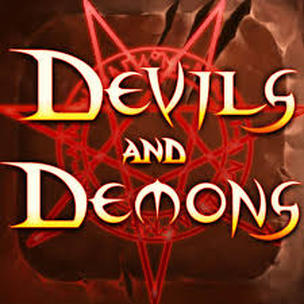
The word “devil” in the above cited passages is translated from the Greek word “daimonion” (# 1140 in Strong's ) which is where the term “demon” comes from (“demon” is the correct translation). It is unfortunate that Strong confused the issue by defining “daimonion” as “a demonic being” which is how the pagan Greeks used the term. We saw earlier (in the lesson entitled “Spirit vs Spiritism") that Greek mythology is full of such “spirit creatures. However, this definition does not fit the Scripture passages we have just studied. In those examples, this Greek word (daimonion), which was translated as “devils” in the King James bible, is used synonymously with the term “unclean spirit(s)" which we have seen is an idiomatic expression referring to human mental or behavioral disorders. Scripture uses the idiomatic expressions “possessed by devils” and “having unclean spirits” to refer to people plagued by some kind of physical or mental disorder. In the same way, the idiomatic expression “casting out of devils” refers to the curing or healing of such infirmities.
”It’s interesting that the King James translation never uses the word “demon” like most other translations do; but “demon” is the more correct translation of the Greek word “daimonion.” The word “devil” comes mostly from the Greek word “diabolos” (#128 in Strong's) meaning “a traducer.”
”It’s interesting that the King James translation never uses the word “demon” like most other translations do; but “demon” is the more correct translation of the Greek word “daimonion.” The word “devil” comes mostly from the Greek word “diabolos” (#128 in Strong's) meaning “a traducer.”
In Summary
We have seen in this lesson that the Bible uses different terms in referring to bad dispositions and physical or mental disorders. Translators used the terms “evil spirit(s),” “unclean spirit(s)” and “devil(s)” to describe them. These terms were not used to refer to mystical, make-believe, supernatural “spirit beings” which are the products of man’s superstitious and twisted imagination. We have also seen that the phrases “casting out of devils” and “casting out of unclean spirits” are idiomatic expressions for the healing or curing of people suffering from various physical and mental disorders. Additionally, Scripture doesn’t use these expressions for the so-called “exorcism” of “spirit creatures.”
Demonism, the belief in so-called wicked supernatural “spirit beings” (demons and devils) that possess and torment people, is a product of pagan mysticism. It has no foundation in God’s Word. Such beliefs are contrary to Scripture. In fact, God’s Word warns against getting involved with such heathen things.
As soon as Christians quit perverting God's Word, believing in and fearing non-existing supernatural entities (devils, demons, and unclean spirits) from a make-believe “spirit world” and begin to rely on the truth of God’s Word, they will be freed from the yoke of priestcraft manipulation and control.
We have seen in this lesson that the Bible uses different terms in referring to bad dispositions and physical or mental disorders. Translators used the terms “evil spirit(s),” “unclean spirit(s)” and “devil(s)” to describe them. These terms were not used to refer to mystical, make-believe, supernatural “spirit beings” which are the products of man’s superstitious and twisted imagination. We have also seen that the phrases “casting out of devils” and “casting out of unclean spirits” are idiomatic expressions for the healing or curing of people suffering from various physical and mental disorders. Additionally, Scripture doesn’t use these expressions for the so-called “exorcism” of “spirit creatures.”
Demonism, the belief in so-called wicked supernatural “spirit beings” (demons and devils) that possess and torment people, is a product of pagan mysticism. It has no foundation in God’s Word. Such beliefs are contrary to Scripture. In fact, God’s Word warns against getting involved with such heathen things.
As soon as Christians quit perverting God's Word, believing in and fearing non-existing supernatural entities (devils, demons, and unclean spirits) from a make-believe “spirit world” and begin to rely on the truth of God’s Word, they will be freed from the yoke of priestcraft manipulation and control.
Bob & Mary Lou Becker {contact us by using the form at the bottom of our Home Page}
